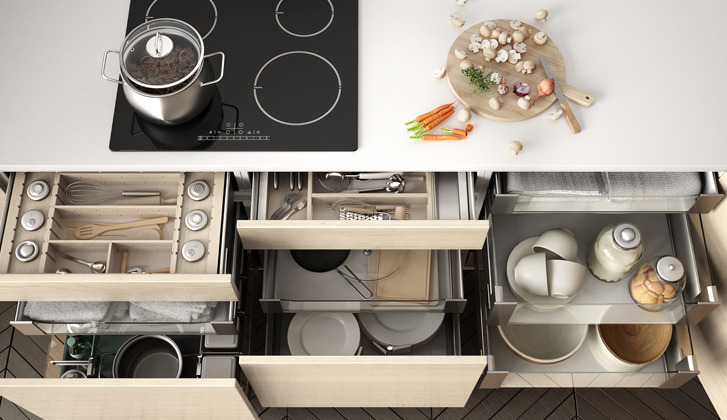NOTICE: Internet Explorer was retired by Microsoft on June 15th, 2022 and is no longer supported. This could change how you access Online Banking.
Combatting the Effects of Clutter on Health and Wealth

How Do You Measure Up?
According to a recent survey, 60% of Americans have been late to work or school because of misplaced car keys or other items, and Baby Boomers are only half as likely to lose things than Millennials. Based on these statistics, you can see where you fall on the disorganization scale. If you’re looking for ways to reduce financial stress, try getting organized. Eliminating clutter in your life can have a positive effect on your health and wealth.
Life is busy and over time you may have lost interest and energy in cleaning up. If you are living with a closet, workspace, or living area that contains disorganized collections of items, here’s a great reason to get busy tidying up: You could lower your anxiety, increase your feeling of well-being, and improve your finances.
Clutter Creates Stress
When you enter a cluttered room, your eye doesn’t know what to land on first and your brain swirls trying to make sense of all the details captured by your senses bouncing around the space. This experience begins to explain the lack of focus you might feel when your workspace, your kitchen, or your entire home is cluttered.
When that cluttered space is your responsibility, filled with your possessions, the stress response is even greater. Studies show that people who live in a cluttered environment experience higher and more prolonged levels of stress. They even suffer stress worrying that their homes aren’t clean enough or organized, but they struggle to embark on a path to reduce the clutter and relieve the stress.
How Disorganization Contributes to Financial Stress
When you are under stress, you tend to make poor decisions and, as a result, your finances could suffer. At the basis of your clutter are a bunch of items you paid money for. Perpetuating a cycle of disorganization affects your financial life in several ways:
- You waste time (and money) looking for things: Remember the adage: Time is money? Imagine how much earlier you could get to work if you didn’t start every day looking for your car keys. When you can’t find the right receipt or last month’s credit card bill, you not only waste time, but you’re less likely to get the refund you are entitled to or end up paying late fees.
- A cluttered lifestyle says a lot about your relationship with money: The habits that result in a disorganized living space can also lead to problems managing money and staying on top of finances. Disorganization can impact your mental health and affect how you make money decisions, from overspending and increasing debt, to living in bigger and more expensive homes.
- Storage units are a zero-sum game: You may be tempted to rent a storage space to manage your clutter. Long-term storage rental, however, represents an expenditure you cannot capitalize on, and it puts your excess stuff out of reach so you’re even less likely to use it. A rental storage space will never increase in value, but the rent can go up. Storing stuff you never use means you are not getting any return on the money you spent to purchase those items.
- Bills get lost and are therefore not paid on time: The number one factor in your credit score is whether you pay your bills on time. Clutter may be holding your credit score down. Even if you receive and pay your bills online, a cluttered home can distract your focus from important activities, causing you to miss payment deadlines.
- You waste money buying things you already have: Buying something once is an expense. If it is something you need and you use it, the expense is justified. If you misplace it and have to buy another one, that is a waste of money. If you find the first item but it is ruined because it was under a pile of wet towels in the laundry room, you’ll have to buy another one without ever benefitting from the initial expenditure.
Think of the clutter in your home as money since you paid for all those items at one time. You wouldn’t leave cash lying around in crumpled heaps. You would sort and stack it neatly and store it in a protected place where you could access it when you needed to make a purchase. That’s the best way to manage your possessions as well, to avoid unnecessary financial stress.
9 Steps to Declutter Your House
You do not have to live with the stress of a cluttered, disorganized home. Reduce your stress and get organized with these nine steps:
- One room at a time: Clutter makes it hard for your brain to work efficiently, so decluttering needs to be a divide-and-conquer activity. It is easy to get overwhelmed by the whole job in front of you. Breaking it up into several small jobs will help. If you keep your decluttering process organized, you’ll find it more effective. Getting one room done will give you the motivation you need to move on to the next room until the whole house is decluttered and organized.
- Sort like items into piles: When you look closely at a cluttered room, you see various things laying around in random places. To begin to bring order to the scene, start by organizing things into piles. In the bedroom, for example, you might create separate piles for clean clothes, dirty clothes, towels, shoes, reading material, and so on.
- Discard the junk: On every pile you will find a few things that are broken, worn out, or out of date. These things have no value. You cannot use them, and you cannot sell them. That is the definition of junk. Lighten your load by donating these items to charity if they are still in good condition or throwing them away.
- Choose Your favorites: One value of creating piles of like things is that you can easily spot duplicates. People who live with clutter often make superfluous repeat purchases, as mentioned above. Not only is this a waste of money, but it is also a waste of space and contributes to the clutter problem. For every duplicate item, save your favorite version and put the others on a discard pile.
- Sell or consign excess items: All those items on the discard pile represent money, even if it is just a couple dollars. The total value of the entire pile could be in the hundreds or even thousands depending on how much stuff you have. Have a garage sale, partner with a neighbor already planning a garage sale, use an online selling platform, or bring things to a consignment shop. Try to recoup some of the monetary value invested in your excess items and get them out of your way so you don’t have to find a place to store them.
- Store Items for handy use: Time to put away the keepers. Think about where you might use each item and try to store it as close to that location as possible. No punchbowls in the bathroom closet or hammers in the kitchen. You’ll find that the storage areas in each room are designed to accommodate items that belong in that room. For example, the bedroom closet has space for hanging clothes and the kitchen drawer is divided for storing silverware. Organizing your closets and drawers will make your daily life easier and relieve some mental stress.
- Designate one location for important papers: Part of being organized is knowing where to find things when you need them. Your financial life will become a little more stress-free when your bills don’t get lost in the junk mail. Choose a location to drop the mail when you bring it in the door each day. Also, designate a space for bills and important papers so you can find them when you need them.
- Snapshot your closets: When you finish organizing and decluttering your house, you should be proud of your accomplishments. Taking a picture will memorialize the result of your efforts. Keeping a snapshot of the interior of every closet, cabinet, and drawer on your phone can help you refrain from buying things you already have. Before buying those wine glasses on sale at your favorite home goods store, check the photo. If you already have wine glasses, you can save that money and get yourself an ice cream on the way home, instead.
- Learn to put things away: The photos on your phone can also help you remember where things go in your newly organized space. Keep things organized by learning to put items away when you finish using them. After all your efforts to organize your house, you won’t want to clutter it up again. When you do buy new things, consider discarding the old ones and putting the new items in their proper places.
It’s Free and Good for You!
It doesn’t cost any money to declutter and organize your home. In fact, in the process of decluttering you could actually make some money by selling the items you don’t need. Getting organized can also improve your health by eliminating stress and bring you a little closer to financial well-being. Your budget will be positively affected by the reduction in unnecessary and repeat purchases.
Interested in reading about some other money-saving strategies and tips? Check out more resources from our Education & Insights library.
Content is for informational purposes only and is not intended to provide legal or financial advice. The views and opinions expressed do not necessarily represent the views and opinions of WesBanco.
While we hope you find this content useful, it is only intended to serve as a starting point. Your next step is to speak with a qualified, licensed professional who can provide advice tailored to your individual circumstances. Nothing in this article, nor in any associated resources, should be construed as financial or legal advice. Furthermore, while we have made good faith efforts to ensure that the information presented was correct as of the date the content was prepared, we are unable to guarantee that it remains accurate today.
Neither Strategy Academy nor its sponsoring partners make any warranties or representations as to the accuracy, applicability, completeness, or suitability for any particular purpose of the information contained herein. Strategy Academy and its sponsoring partners expressly disclaim any liability arising from the use or misuse of these materials and, by visiting this site, you agree to release Strategy Academy and its sponsoring partners from any such liability. Do not rely upon the information provided in this content when making decisions regarding financial or legal matters without first consulting with a qualified, licensed professional.
Explore WesBanco Insights
Discover how WesBanco can help you prepare for the road ahead. Gain exclusive insights and learn how to achieve your financial goals.
Education & Insights



